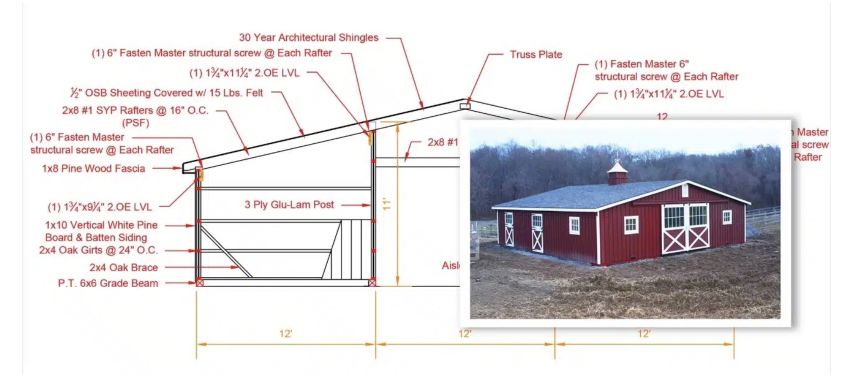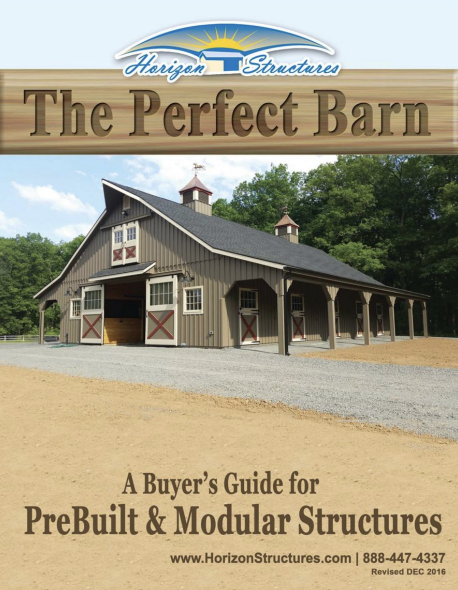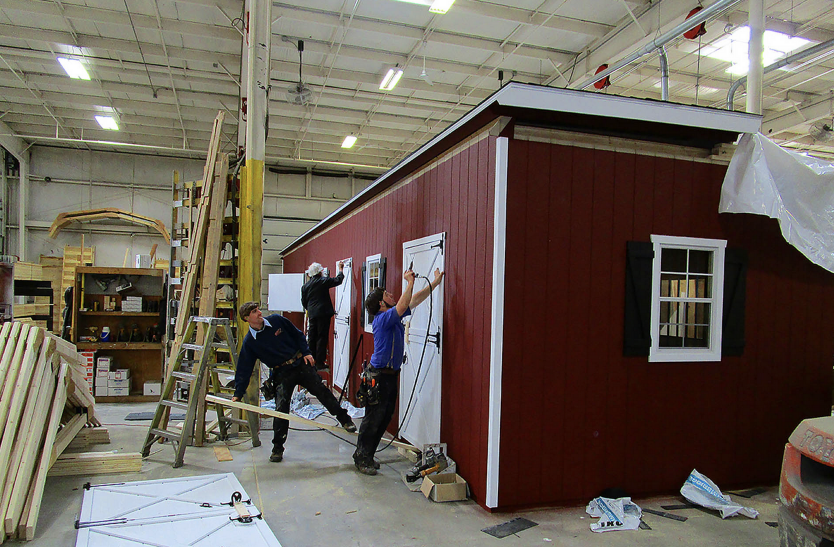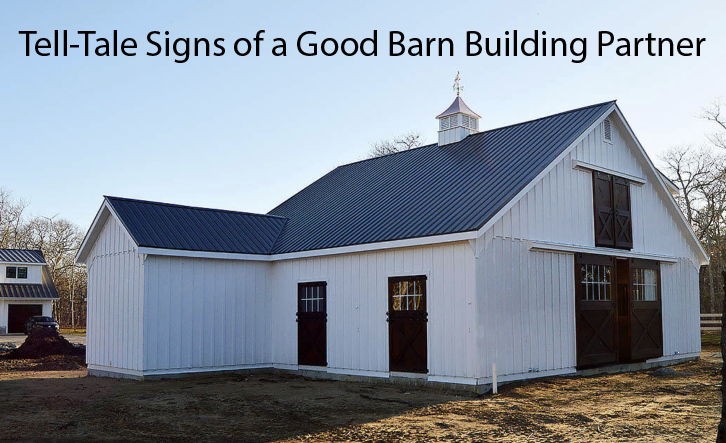Tell-Tale Signs of a Good Barn Building Partner
by Nikki Alvin-Smith
The purchase of a new horse barn is a large capital investment. When it comes time to select who to trust to partner up with to construct it the market is full of choices. Parting with your hard-earned money should be done with caution.
The Estimate
When you purchase a product or service, the ubiquitous use of the term, ‘estimate’ is commonly mentioned by the vendor of such product or service. But think about it, what is the definition of the word estimate? When used as a verb it simply means a tentative or approximate value or determination. When used as a noun it means a rough or approximate calculation. So, in layman’s terms, it’s the builder’s best guess.
When you talk to a builder or construction company representative or owner about the cost of a new horse barn, presumably and indeed hopefully, this is something they have built before. So if the parameters have been determined in regard to the structure’s size, the number of doors and windows, and its configuration and the materials to be utilized are known components such as pressure-treated ground contact 6” x 6” posts, why doesn’t the builder know the cost?
Ah – there are unknown factors and variables perhaps. But are there really?
“Depends how long it will take,” you may be told. Shouldn’t the builder know how long the work is expected to take? Hasn’t the structure or one similar been built by the company before?
“Depends on how many crew members I have available,” is another excuse. Shouldn’t the builder know how many framing carpenters, roof specialists or other workers they need and have on staff to build the barn?
The Quotation
But of course, it could be worse than an ambiguous estimate, you could be offered a quotation. Ah – that’s better you think. Quotation means you should receive a formal statement setting out the estimated cost for a particular job or service. So that’s not vague sounding at all. But beware there are different types of quotations.
In theory, the quotation is an agreed fixed price while an estimate is an approximate price that may change. A quotation can be a legally accountable document but there are caveats and you can be sure the ‘quotation’ form will have small print with one or more ‘out clauses’ that say the quotation is, ‘non-binding,’ or is only accurate once the contract is signed. Ah the contract, another opportunity to confuse the issue. But more on that later. Always check both sides of the paper or document you receive as often the back of the document holds much fine print that you need to read and understand.
Note: Similarly, if signing on a tablet or device, don’t be rushed into signing off on anything you haven’t thoroughly read and understood and always get a copy of what you sign and always date it with full date including 4-digit year.
Sadly, you may believe that your quotation is better than an estimate to determine the actual price you are to pay for the product and in most cases it is. However, beware of being naïve and being talked into accepting a specific type of quotation, the old chestnut, “Time and Materials.”
This term is just as open-ended as it sounds. When you hear this expression, run a mile. Time and material pricing is a great way of adding to the estimate or quote. Isn’t the whole reason you are asking for a ‘nailed down’ detailed quotation, because you want to know how much the total completed job or construction project will cost, what materials will be used and what features in the build will be included?
Doesn’t the builder know what materials will be used and doesn’t the price on those materials come guaranteed for at least 30 days from the supplier? Based on previous construction of a similar barn doesn’t the barn builder know how many hours of labor the process of erecting the structure will take? Are you expected then to pay for workdays lost due to inclement weather, crew members that are inefficient or even downright incompetent? Or foot the bill for fixes that need to be made to work completed later because an inexperienced crew member messes up and the work is not properly supervised? Humm.
When it comes to undertaking a major project like building a barn, the importance of having a hard number in your hand that determines how much you will pay is essential. Think of all the ways the price could change or be manipulated otherwise:
· Overages where too many materials are purchased.
· Substituted materials of better or lesser quality, and in the case of the former the savings won’t be passed on to you.
· Wasted materials due to incompetence.
· Misplaced materials or errors in ordering supplies or inaccurately fulfilling orders.
· Lack of control over what materials are actually received on site.
· Overlooking delivery charges for multiple deliveries.
· Damage to materials caused by poor storage or loss due to theft.
The bigger the project the bigger the amount of money you expect to pay. Unfortunately, this also means the bigger the opportunity for errors to occur.
These upsetting changes in pricing could occur completely accidentally due to lack of experience and knowledge on the part of the construction company or be a deliberate business method of padding the bill.
The “To-The-Penny-Quote.”
Ideally the purchase for your new barn will be truly ‘nailed down’ with a detailed, ‘to the penny’ quotation or purchase price. This document should be set out with clearly defined building products that will be used and a draftsman engineered drawing of the exterior sizing of the structure that identifies the placement of these materials.

Learn to Make sense of Barn Building Plans
Note: In business such a document may be called a “Purchase Order,” and it would be signed as a binding agreement to purchase the product at the set price and parameters outlined. Those parameters would likely include time for completion or delivery, and how long the price offered is valid (if it is the document that is to be paid it would be an “Invoice.”).
When you opt for modular barn build from a reputable company, not only can you obtain a clearly written purchase document that includes the building, it will and should also include the actual price for its delivery to your location and the barn’s complete set up. There should no unknowns.
When making your choice of building partner and are offered an estimate, a quotation or a ‘to the penny’ price in writing, consider this analogy.
If you entered a hair styling salon and asked how much for a wash, cut, color and blow dry, presumably the hairdresser would ask you for more details of what you would like done. For example, do you want a permanent color or temporary? Do you want highlights or straight color? Do you want a full colorization or just roots of your hair touched up? And what about the cut? Do you have an idea of the style you’d like? Once the variable factors have been agreed does the hairdresser turn around and say,
“I would guess it would cost about X, depending on how much shampoo we use, how long it takes me to cut your hair and how quickly it takes color. But I’ll let you know after we get started. I’ll have a better idea then?”
Standard Features, Upgrades and Change Orders
If your builder is going to charge you extra for common requirements that any barn owner would want in the barn, such as a partial safety kickwalls or windows in every stall, then you know it is most likely just the construction companies’ method of ‘building the check.’

See These Top 5 Tips for Dilligent Horse Barn Shopping.
Decent quality components should be included as a given, including smaller items like hardware, proper methods of attachment for roofs to rafters and rafters to ridge or header beams/top plates and structural members of the barn.
Companies both large and small will often conveniently (for them) overlook mentioning what is included as ‘standard’ in their barns and what is an upgrade.
 If you want to substitute or upgrade a feature, that should be defined and priced in the quotation or purchase order. If you choose to make changes once the building has begun, whether that is on site or at the factory, then you can expect there to be a change fee to cover the extra work. It pays to figure out what you want upfront and stick to it if possible to avoid these extra charges and possible time delays.
If you want to substitute or upgrade a feature, that should be defined and priced in the quotation or purchase order. If you choose to make changes once the building has begun, whether that is on site or at the factory, then you can expect there to be a change fee to cover the extra work. It pays to figure out what you want upfront and stick to it if possible to avoid these extra charges and possible time delays.
Think of it this way:
If you go into a restaurant and order a meal, you don’t expect the restaurant management to charge you extra for a plate and knife and fork or expect you to pay extra for sides (unless it is an ‘a la carte’ menu).
Similarly, you would expect the price you are to pay for the meal to be accurately reflected on the menu and whatever sides your meal comes with to be mentioned. If you order a ‘steak and fries’, you should know whether to expect a filet mignon to arrive or a Salisbury steak made from ground beef. If the plate is delivered in front of you with potato chips or rice instead of French cut fries you may not be happy with the substitution, especially if you are not warned about it before you place your order.
The All-Important Contract and Parting With Your Money
Any large-scale building project should include a clearly written, uncomplicated but complete, easy to understand contract. This document is a legal document when executed by both parties of the arrangement.
While signature moves like substituting materials can be negated with clauses such as, “No substitutions of materials without purchaser’s written consent,” also consider that a busy company may determine they’d also like to sub-contract the work to be completed to someone else. A clause that dictates that the company you are signing off with is the responsible party and that ‘no subcontracting of services,’ with exceptions for specially licensed trades such as electrical or plumbing services if relevant to the particular project, may be pertinent.
Remember that any contract can be negotiated, not just in price but also in its terms and conditions, but any such changes must be initialed on the contract by both parties involved in the transaction.
And consultation before signing any legal document with an attorney is always a good idea if you lack experience in this arena or if the contract is wordy and full of jargon.

The contract should define when payments for the product are due. For example, 10% at time of signing the contract as deposit or to ‘hold’ the building if you are purchasing online from the sales lot at a modular barn company (a great place for good deals!), with another 40% due before production begins and 50% remainder at delivery or before shipment etc.
The contract should also define the expected timeline for the start and completion of the work to be undertaken.
There is the chance that you may change your mind about your barn purchase altogether. Perhaps due to an economic loss such as losing your job, or a change of heart due to illness in the family etc. The contract should clearly define what amounts are and are not refundable and when.
Warranties
In an ideal world every contractor or building company would stand behind its workmanship and products. Sadly, this is often not the case.
While some components used to build the barn will be warrantied on a limited basis by the manufacturer, the workmanship and installation of such products is the responsibility of the building professional you hire.
Make sure the company you choose to collaborate with on your barn building project puts their warranty policy in writing on the contract.
Don’t be fooled by comments such as, “I will give you details of the warranties once we’ve finished. They all come from the manufacturers when you sign off.”
If you walked into a car dealership to buy a new car and the salesman told you,
“We can discuss the warranty after I see how well you test drive the car, choose the model and you’ve signed off and bought the car. Once you sign up with the manufacturer they’ll send it to you,” you wouldn’t accept that would you?
In conclusion
The navigation of the minefield of what can go wrong on a new barn purchase agreement is completely down to you. You are truly the captain of that ‘project’ ship and making the whole process plain sailing is possible.

Before you select your building partner consider carefully their proven experience delivering the quality and standard of construction you want to own.
The company should be able to do more than hand you a list of phone numbers from a few other local customers, they should be able to illustrate the actual products they have produced and be transparent in sharing work that have completed for their existing clients.
If in doubt, always follow your gut. Your time is important and the response to any requests, calls or emails you make should always be professional, timely and positive.




